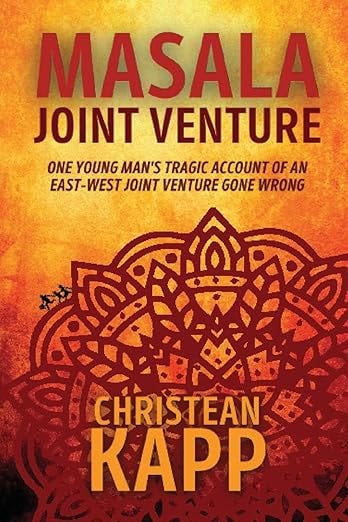Corporate corruption costs the global economy an estimated $3.6 trillion annually, eroding public trust and destabilizing markets. Studies show that nearly 60% of fraud cases within organizations go undetected due to a lack of internal accountability. The future of capitalism hinges on those brave enough to challenge unethical practices and ensure that transparency and integrity remain the cornerstones of a thriving, sustainable economy.
However, the road of a whistleblower is fraught with obstacles. In Christian Kapp's riveting book Masala Joint Venture: One Man's Tragic Account of an East-West Venture Gone Wrong, readers are thrust into a whirlwind of corporate intrigue, cultural clashes, and moral dilemmas. This memoir-style narrative peels back the layers of a joint venture between German and Indian corporations in the 1990s, exposing the devastating impact of unchecked corruption and the absence of accountability.
Set against India's industrial evolution backdrop, Kapp's story is more than a cautionary tale—it's an exposé of systemic failures reverberating in today's globalized business environment.
A Promising Beginning
In 1994, Christian Kapp, an ambitious young German engineer, was given the opportunity of a lifetime. As part of a joint venture in Pune, India, Kapp was tasked with bridging German precision and Indian innovation. Foreign companies couldn't operate independently in India then, so joint ventures were the only route.
"Yes, the opportunity came to represent DEMAG in India. At that time—early to mid-1990s—foreign companies couldn't operate independently. We had to establish a joint venture, and ours was with the Kirloskar Group, a prominent industrial conglomerate in India," Kapp recalls.
Kapp's mission was clear: to build a thriving partnership between the two companies, leveraging each other's strengths. His role was pivotal, and he worked closely with an Indian counterpart to manage operations, foster collaboration, and navigate the complexities of cultural and corporate integration.
The Unraveling of the Venture
However, the venture soon began to show cracks. What started as a promising collaboration quickly descended into chaos. Kapp began to notice discrepancies in the company's financial records and operational practices. "It didn't take long to see that the numbers weren't adding up," he noted.
His attempts to address the issues were met with resistance—senior staff members stonewalled his concerns, and one sales manager seemed intent on actively sabotaging projects.
A Culture of Corruption
The deeper Kapp delved, the more he uncovered a disturbing "gravy train" of corruption benefiting a select few while the company struggled.
"There was a whole system—a gravy train, so to speak—benefiting a few individuals while the company suffered," Kapp explains. The joint venture's dual reporting structure, a hallmark of German efficiency, was being manipulated. Managers in both countries were lining their pockets while leaving the company to languish in inefficiency.
"Companies like Siemens and ours typically rely on collaborative efforts between divisions and country managers, but selfish motives and lack of transparency repeatedly undermined this structure," Kapp reveals, highlighting the systemic nature of the corruption. A few individuals' selfish motives destroyed the business and set a dangerous precedent for other multinational corporations operating in India.
The Turning Point
Kapp's decision to escalate his findings to the German headquarters marked a defining moment in his career. Armed with evidence of financial misconduct and operational inefficiencies, he expected support from his superiors. Instead, he was met with indifference. The more Kapp uncovered, the more dangerous his position became.
"Yeah, I felt insecure. The threats came in. This was from people I knew—my direct boss, the president," Kapp shares, illustrating the personal and professional risks he faced. The threats weren't direct, but the implications were clear: "They implied bad things would happen. I didn't want to ask for details; I just knew my future was over at that company."
Despite the mounting pressure, Kapp refused to back down. His quest for accountability culminated in a climactic confrontation with the German executives, where he exposed the systemic corruption that had plagued the venture from its inception.
Lessons in Accountability
Masala Joint Venture is not just a tale of corporate betrayal—it's a stark reminder of the dangers of unchecked power and the cost of ignoring accountability. Kapp's experience underscores the devastating consequences of prioritizing profits over principles. As he reflects on the events, Kapp notes the broader implications: "I thought it was crucial, not just personally, but also for corporate crime. A lot of people are losing their investments because companies aren't profitable. This story shows how managers align with partners with no control, which is a recurring problem."
Moreover, Kapp's experience warns against the consequences of allowing such corporate malpractice to go unpunished: "There was no accountability. The companies would often remove themselves from Wall Street listings, no longer accountable for corruption." This lack of oversight and transparency is a dangerous trend that continues to this day.
A Call for Accountability
The book also underscores the importance of cross-cultural understanding in global business. Despite the challenges, Kapp's ability to adapt to India's unique cultural landscape was instrumental in his journey. His experiences in the joint venture illustrate how even well-intentioned companies can be derailed when accountability and ethical standards are not prioritized.
Today, Kapp lives in Houston, Texas, where he works as a turbomachinery consultant and engineering professor. He remains passionate about fostering ethical business practices, drawing from the hard-earned lessons of his time in India.
Reflecting on his journey, Kapp hopes Masala Joint Venture will serve as both a warning and an inspiration.
"More accountability and oversight are needed. People's lives and incomes depend on it," Kapp asserts.
He is resolute in his belief that corporate corruption continues to thrive, especially in large multinational corporations.
"Yes, it still goes on. Many companies make small amounts of money through corruption with suppliers. They control these divisions into non-profitable companies. It's happening even with corporations like SPX. Payments to vendors are not tendered correctly, and this cycle continues," Kapp warns.
In a world where corporate greed often overshadows individual integrity, Masala Joint Venture stands as a testament to the power of perseverance and the enduring fight for justice. This isn't just the story of one man's harrowing experience; it's a piercing examination of the systemic failures that permeate the corridors of power in multinational corporations.
Kapp's journey—from a hopeful young engineer tasked with bridging East and West to a disillusioned whistleblower risking everything to uncover the truth—offers a cautionary tale with implications far beyond its historical setting. In an era of increasing globalization, Masala Joint Venture reminds us of the universal value of accountability and the courage it takes to confront corruption, even when the odds seem insurmountable.
Masala Joint Venture is available now. For more information, visit www.masalajointventure.com
FOR EXCLUSIVE GLOBAL CONTENT AND DIRECT MESSAGING, PLEASE CONSIDER A PAID SUBSCRIPTION TO THIS SUBSTACK TO HELP KEEP INDEPENDENT, AGENDA-FREE WRITING AND JOURNALISM ALIVE. THANK YOU SO MUCH FOR YOUR SUPPORT.
For speaking queries please contact meta@metaspeakers.org
For ghostwriting, personalized mentoring or other writing/work-related queries please contact hollie@holliemckay.com
Follow me on Instagram and Twitter for more updates
Order The Dictator’s Wife (out June 10)
Click Here to Order from my publisher DAP Publications (please support small business!)
Click to Purchase all Other Books Here





